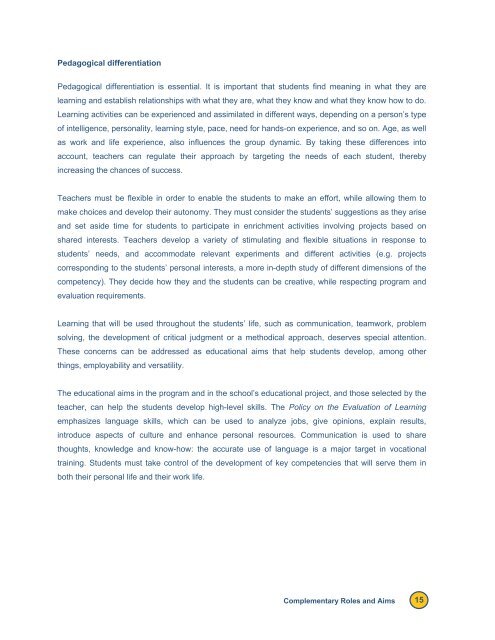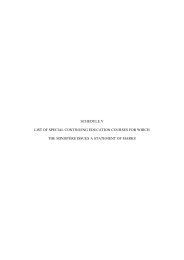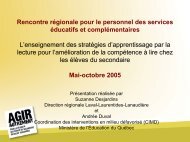Reference Framework for Planning Learning and Evaluation Activities
Reference Framework for Planning Learning and Evaluation Activities
Reference Framework for Planning Learning and Evaluation Activities
Create successful ePaper yourself
Turn your PDF publications into a flip-book with our unique Google optimized e-Paper software.
Pedagogical differentiation<br />
Pedagogical differentiation is essential. It is important that students find meaning in what they are<br />
learning <strong>and</strong> establish relationships with what they are, what they know <strong>and</strong> what they know how to do.<br />
<strong>Learning</strong> activities can be experienced <strong>and</strong> assimilated in different ways, depending on a person’s type<br />
of intelligence, personality, learning style, pace, need <strong>for</strong> h<strong>and</strong>s-on experience, <strong>and</strong> so on. Age, as well<br />
as work <strong>and</strong> life experience, also influences the group dynamic. By taking these differences into<br />
account, teachers can regulate their approach by targeting the needs of each student, thereby<br />
increasing the chances of success.<br />
Teachers must be flexible in order to enable the students to make an ef<strong>for</strong>t, while allowing them to<br />
make choices <strong>and</strong> develop their autonomy. They must consider the students’ suggestions as they arise<br />
<strong>and</strong> set aside time <strong>for</strong> students to participate in enrichment activities involving projects based on<br />
shared interests. Teachers develop a variety of stimulating <strong>and</strong> flexible situations in response to<br />
students’ needs, <strong>and</strong> accommodate relevant experiments <strong>and</strong> different activities (e.g. projects<br />
corresponding to the students’ personal interests, a more in-depth study of different dimensions of the<br />
competency). They decide how they <strong>and</strong> the students can be creative, while respecting program <strong>and</strong><br />
evaluation requirements.<br />
<strong>Learning</strong> that will be used throughout the students’ life, such as communication, teamwork, problem<br />
solving, the development of critical judgment or a methodical approach, deserves special attention.<br />
These concerns can be addressed as educational aims that help students develop, among other<br />
things, employability <strong>and</strong> versatility.<br />
The educational aims in the program <strong>and</strong> in the school’s educational project, <strong>and</strong> those selected by the<br />
teacher, can help the students develop high-level skills. The Policy on the <strong>Evaluation</strong> of <strong>Learning</strong><br />
emphasizes language skills, which can be used to analyze jobs, give opinions, explain results,<br />
introduce aspects of culture <strong>and</strong> enhance personal resources. Communication is used to share<br />
thoughts, knowledge <strong>and</strong> know-how: the accurate use of language is a major target in vocational<br />
training. Students must take control of the development of key competencies that will serve them in<br />
both their personal life <strong>and</strong> their work life.<br />
Complementary Roles <strong>and</strong> Aims 15




